Events
BAM Honors Dr. Martin Luther King Jr. in 36th Annual Celebration
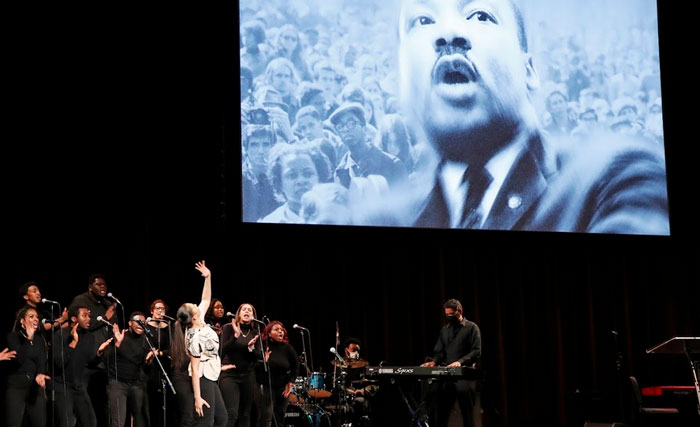
Brooklyn Academy of Music (BAM) hosted its annual Tribute to Dr. Martin Luther King, Jr. The 36th annual event took place Monday in the Howard Gilman Opera House and was livestreamed.
The celebration included a keynote speech by critically-acclaimed author and cultural historian Dr. Imani Perry and remarks from:
Governor Kathy Hochul, Mayor Eric Adams, Brooklyn Borough President Antonio Reynoso, Senator Charles Schumer, Senator Kirsten Gillibrand, Council Member Crystal Hudson, Congressman Hakeem Jeffries, Speaker Adrienne Adams, District Attorney Eric Gonzalez, and BAM Co-Interim President Coco Killingsworth were among those addressing the crowd. Below are excerpts from several of the remarks.
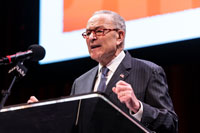
Senator Majority Leader Charles E. Schumer.
Today we honor the legacy of the Reverend Dr. Martin Luther King, Jr., a man whose words and deeds accomplished nothing less than the elevation of the human race.
It’s no coincidence that MLK Day is the only day on our calendar dedicated to a single American. We have Mother’s Day for the mothers, Father’s Day for the fathers, July 4th for the nation’s founders, Veteran’s Day for the veterans, but only one day for one man. And that’s just who Dr. King was, singular, exceptional, unique.
…He lifted a giant mirror on his broad shoulders. And with his eloquence, his brilliance and with his faith, he forced America to look into that mirror. And America did not like what it saw, with all the racism, bigotry and discrimination. And that began our long trek to try and get full equality and end bigotry. We’re not there yet, but Dr. King’s mirror is still there showing America we must do better.
Senator Kristen Gillibrand (D-NY)
Our work starts with everyone having a say at the ballot box. We have to pass voting rights laws. We have to protect fundamental civil rights and civil liberties. And if that means getting rid of the filibuster, then w should be getting rid of the filibuster. Our work starts with addressing the inequalities our healthcare system has shown. We know that Covid has shown it is harder for Black and Brown communities to access care, it has left them more susceptible to Covid and it has left them more susceptible to many diseases and underlying health conditions.
One of those conditions is maternal mortality. We have seen in this city and this state, that women, Black women in particular, are up to three times more likely to die in childbirth or within a year of giving birth because of the color of their skin. This has to end. And I am working in Washington to change laws
It also starts with our public schools… …We have to see our schools as a pillar of our democracy and a cornerstone of our economy. Looking forward, I believe we should look at our schools as “critical infrastructure.” They should be so designated. And with that, resources should flow. Schools should be among the institutions first in line for PPE, for masks, so every child has a mask when they walk in the door. To make sure every child has access to the vaccines that they need on a timely basis. So teachers have access to vaccines, PPE, testing, so they know that when they go to teach, they are teaching in a safe place. That is how we should be imagining our schools. The safest place for our kids to be.

Governor Kathy Hochul
We come together year after year to talk about his life what he did as such a young person. He was just a teenager paractically when he got involved. 26-years-old when he led the Montgomery Bus Boycott. -…He planned the March on Washington as a 34-year-old young man. And he wrote some of hostory’s most powerful and poignant letters to the leaders around the world to fight for a cause he believed in to his core, is that every man woman and child is entitled to dignity and to equal rights sand they should never be denied. …He said every one of us should ask ourselves daily, “What are we doing for others?”

Brooklyn Borough President Antonio Reynoso
First I’d like to introduce everyone and welcome them to the center of the universe, that is Brooklyn, NY. The sun to the solar system that is New York City. Everything revolves around us. The light that shines among the other boroughs… I can’t tell you how grateful and how happy and proud I am to be able to stand here before you. A young, poor Brown by from the southside of Williamsburg to stand on this stage, honoring the legacy of Martin Luther King, Jr. really is something that I don’t tink in my wildest dreams that I ever could have accomplished.
…Right now, I want to talk about Dr. King’s legacy, as his family has called for a day of action for voting rights sand is leading a march in Washington as we speak. As his son Martin Luther King, 3rd said “this is a day on, not a day off.”
Here in the city of New York I am proud to say we recently passed the Our City, Our Vote legislation. Which I was proud to co-sponsor when I was a city councilmember. It’s the largest expansion of voting rights in over 50 years, allowing noncitizens to vote in our municipal elections.
Yet voting rights sand ballot access remain under threat throughout the country, putting the very future of our democracy at risk. Literally, since Reconstruction, there have been forces a work in state and local governments, trying to claw back any gains made in civil rights and enfranchisement and it is still happening today. Just last week in Texas, it became illegal for an elected official to promote voting by mail. Georgia’s 2021 election law changes were so restrictive that the justice department sued and now the Republican leaders are looking at new ways to keep Black and Brown people in disenfranchisement.
When Florida voters restored the vote to previously incarcerated people, the state’s Republican governor and legislature, intervened to require fees that echoed Jim Crow poll taxes. Even here in New York City, last Friday Republicans filed a lawsuit to stop the Our City, Our Vote legislation from being implemented. And we can’t let this happen.
Martin Luther King Jr. said “when people get caught up with that which is right, and they are willing to sacrifice for it, there is no stopping point short of victory.”
Let this remind us that we have to defend what we believe in by standing with all of our allies, all over the country to demand the passage of the national voting right legislation and to support local efforts on the ground to enfranchise voters of color. Here at home, as your Borough President, I will do everything I can to defend the historic Our City, Our Vote law and ensure that it is fully implemented throughout Brooklyn and the rest of New York City. I will support reforms to our Board of Elections and policies like Same Day Voter Registration, No Excuse Absentee Ballots, better working conditions for poll workers and more efficient voting procedures so that you don’t have to wait in line all day just to cast a ballot. Martin Luther King, Jr. called American democracy a dream unfulfilled. Let us Let’s work everyday to fulfill that dream, thank you.
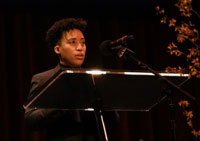
Crystal Hudson
…These 17 deaths [ause by the Bronx fire] were unjust and untimely. We know that dismantling systemic racism and white supremacy is racial justice. And that battling police brutality and securing voting rights is racial justice. But fighting for fair and just housing is also racial justice. Insuring landlords keep the heat on in the winter where Black people live, is also racial justice. Accountability when building owners and management companies intentionally violate our laws and leave Black folks to die in their own homes is racial justice.
I pray for the families we lost in th Bronx. Justice will never come for them, their loved ones will not return but we can fight for accountability and we can fight to protect the most powerful mechanism of accountability, one’s right to vote. As we honor Dr. King, his family reminds us that today is not a celebration without meaningful action. Truly honoring Dr. King means advancing the basic tenets of democracy in our country and following the clarion call to secure ballot access for millions of Americans.
In 1965 after the Voting Rights Act languished in the House rules Committee after passing in the Senate, Dr. King wrote a letter titled “Let My People Vote,” in the New York Amsterdam News urging its passage as the first step in ensuring access to the ballot. He outlined a plan to register thousands of Black Americans across the South to vote, county by county from Virginia to Florida. In his letter he reminds readers “We cannot rest laurels have not yet been earned. We must toil on during the hot, sweltering summer months. We must get our long-deprived people registered in the South’s infamous Black Belt counties. Voting legislation does not put the names of Negroes on voting lists. We are not so naïve as to believe that persons who have traditionally opposed our right to vote, will not desist from intimidating us. There must be change. There will be a change.”
Today, eleven states have strict voter ID laws, a modern poll tax. Southern states closed twelve hundred polling places and millions are removed from their local vote roll each year, including the more than 200,000 Georgians, many of whom were Black, who were wrongly removed from the voter rolls ahead of the 2018 gubernatorial election, preventing the U.S. from having its first Black female governor, my Spellman sister, Stacey Abrams.
The legacy of Jim Crow and the deep roots of White supremacy, have clearly ignored Dr. King’s call for change. Today I urge you to not rest. Because our laurels have not yet been earned. I urge you to get involved and remain involved. And I urge you to join the King family and continue to put pressure on the naysayers in Washington to pass the Freedom to Vote Act and the John Lewis Voting Rights Act. Our democracy depends on each of us actively participating and holding ourselves accountable to its success.
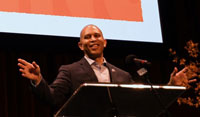
Congressmember Hakeem Jeffries
Today is a day of reverence, a day of remembrance and a day of recommitment. It’s a day of reverence for us to honor publicly to celebrate to thank the Reverend Dr. Martin Luther King, Jr. for all that he did. He made America a much better place than the nation that he inherited. So we’re thankful for him and our civil rights heroes and footsoldiers. It’s a day of reverence for Dr. King. It’s also a day of remembrance, for us to remember the service, the sacrifice, and the struggle of Dr. King. On this journay toward justice, you can’t get from your point of departure to your point of destination without at some moment along the way encountering turbulence.
It wasn’t easy for Dr. King, it wasn’t easy for John Lewis, It wasn’t easy for Fannie Lou Hamer, it wasn’t easy for Rosa Parks. It wasn’t easy for A. Phillip Randolph and all the heroes and foot soldiers. They had to encounter turbulence. Bull Connor in Birmingham, that’s turbulence. Sheriff Jim Clarke in Selma, that’s turbulence. The racist Governor George Wallace, in Dixie, that’s turbulence. You can’t get from your point of departure to your point of destination on your journey towards justice, without encountering turbulence. So we remember and we respect that. Because when Dr. King would come into town on a desegregation campaign or to elevate the right to vote, he wasn’t greeted with wine and roses. He was greeted with Billy clubs, and fire hoses. They encountered turbulence each and every step of the way. But they had faith that things could be different and they put the work in and as a result of Dr. King’s leadership and partnership with so many civil right heroes and foot soldiers. Just think about what they were able to accomplish. The 1964 Civil Rights Act, 1965 Voting Rights Act, Medicare, Medicaid, HeadStart, the Elementary and Secondary School Education Act, the Higher Education Act. The Immigration and Nationality Act, the 1968 Fair Housing Act. In just five short years, they transformed America. And we’re thankful for that. They didn’t have the internet, they didn’t have cell phones, they didn’t have Facebook, they didn’t have Twitter or Instagram but they had faith. And they transformed America.
Lastly it’s a day of recommitment. Because while Jim Crow may be dead, he’s still got nieces and nephews that are alive and well. So we’re battling the ghost of the Confederacy right now who are trying to turn back the clock. Y’all know about that, back in Washington DC. Wickedness in high places . But that’s okay because we are going to channel the spirit of Dr. King to continue to make progress in America. We’ve got turbulence down in Washington but we’re going to fight through it just like Dr. King and others did.
And as we fight through it. No matter what it takes we are going to pass the John Robert Lewis Voting Rights Act. We are going to pass the Freedom to Vote Act. We are going to end the era of voter suppression in America once and for all. As Dr. King said, “We shall overcome.” Thank you.
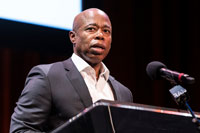
via Getty
Mayor Eric Adams
At the beginning of the year, prior to taking office as the Mayor of New York, I took a trip to Ghana and I went into the dungeons and saw the small spaces where our ancestors were held for many days, sometimes for 2-3 months, living in their own waste, eating one meal a day. Not seeing the sunlight, being ripped apart from their families, never to see them again. Only to understand that leaving that that horrific place, the pain and uncertainties would increase when they reached south central America, Cuba, only to come here to America and watch the continuous devastation. I needed to do that because it must reignite my spirit and be clear on what the journey lies ahead of us and what we must accomplish.
I’ve heard over and over again how hard it is to be the Mayor of the City of New York. I said no, hard is living in that dungeon. Hard is watching your wife or your mother have the baby ripped from their stomach to send a message. Hard is working in the field all night, deliver your baby and going back to work again. Hard is watching someone kick in the cabin door and sodomize and rape your children and have you still stay on that plantation. Hard is building America, only to watch yourself relegated to a position where you will never participate in the prosperity that this country has to offer. That’s hard. That’s hard. Where we are now, no matter how challenging it is, we can become King-like. His name has transcended in identity and has become a message, a symbol.
How do we become King-like? We stop and educational system where we spend $38 billion yet 65% of Black and Brown children never reach proficiency in this city. That’s being King-like. King-like is doing dyslexia screening so we don’t have prisons where 30% of our children or dyslexic and 55% have a learning disability. Giving them the opportunity. If you don’t educate, you will incarcerate and we need to stop that incarceration that takes place at childbirth.
Being King-like is having housing that people can afford to live in, where NYCHA residents are not seeing the conditions that don’t allow them to have a safe environment. Being King-like is making sure people who are dealing with mental health crises will have the support that they deserve, so we don’t have 48% of our prisoners at Rikers don’t have mental health crises. Being King-like is insuring that as we recover as a city, we don’t recover for some and ignore others. We end the inequality that we have seen persistent in our city over and over again. Being King-like is dealing with the gun violence, that would take a 19-year-old child working in Burger King to provide for her family, and now we have lost her. Stopping the flow of guns from the southern part of the country into our cities in the northern part. Ther are no gun manufacturers in Chicago, there’s no gun manufacturers in New York, there’s no gun manufacturers in Detroit. Being King-like is stopping the source. That’s’ what I must do as the mayor of this city. If I am just the second African American Mayor of the City of New York, and I fail to stop the systemic problems we have been facing, then I’ve failed that journey I took in Ghana. I’ve failed those who laid the path for me to be here. I’m committed and dedicated to getting this job done.


